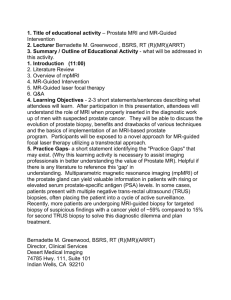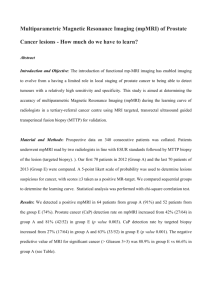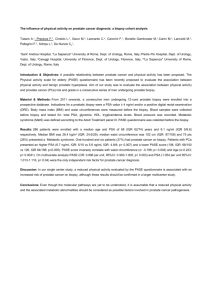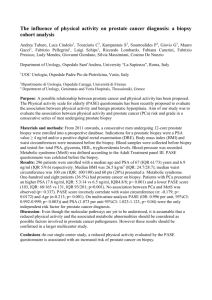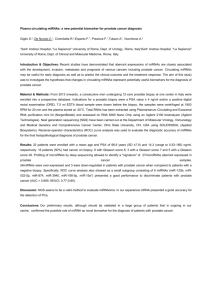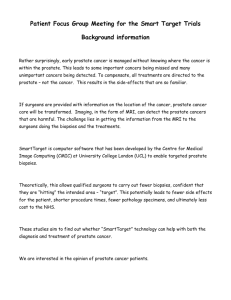Prostate biopsy
advertisement
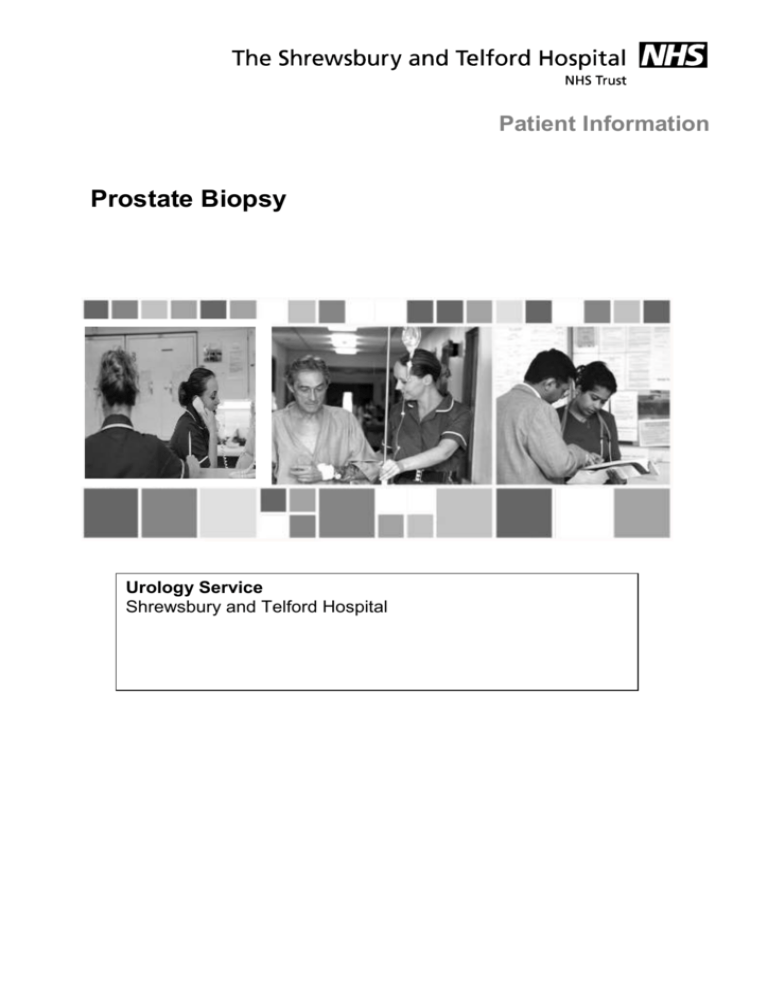
Patient Information Prostate Biopsy Urology Service Shrewsbury and Telford Hospital About the prostate gland? The prostate gland sits just below the bladder. It surrounds the urethra (the tube through which the urine leaves the bladder). The back of the prostate gland can be located during a rectal examination. The healthy prostate gland is about the size of a walnut and has two lobes. The prostate produces the white fluid called semen. It also produces a protein called prostate specific antigen (PSA). The level of PSA in the blood stream is dependent on age. Why do I need a biopsy? If your PSA blood test is raised outside a level for your age or if abnormalities are felt during a digital rectal examination (DRE) you may be advised to have a biopsy of your prostate gland. The PSA Blood test PSA (prostate-specific-antigen) is a protein produced by the prostate and released in very small amounts into the bloodstream. When there is a problem with the prostate, such as when prostate cancer develops and grows, more PSA is released, until it reaches a level which is outside normal limits. During a PSA test a small amount of blood is drawn from the arm, and the level of PSA is measured. PSA levels vary according to age. PSA levels can be elevated if other prostate problems are present, such as BPH (benign prostatic hyperplasia i.e. enlarged prostate) or prostatitis. Some men with prostate cancer have “low” levels of PSA. This is why both the PSA and DRE are used as indicators to detect the presence of the disease. Digital Rectal Examination (DRE) During a DRE, the Specialist inserts a gloved, lubricated finger into the rectum (back passage) and examines the prostate for any irregularities in size, shape and texture. Often the DRE can be used by Specialists to help distinguish between prostate cancer and non-cancerous conditions such as BPH. Although the DRE and PSA tests cannot diagnose prostate cancer they can signal the need for a biopsy to examine the prostate cells and determine whether they are cancerous. If cancer is suspected you will be offered a prostate biopsy. Possible risks or complications of prostate biopsy. Bleeding There is almost always minor bleeding from the back passage following this procedure. You may also see a small amount of blood in your urine and ejaculate (semen).This may last for 2-7 days 2 blood in your ejaculate may last up to 4-6 weeks. If the bleeding becomes heavy or you pass clots please contact your family doctor (GP). Infection Infection of the prostate gland is a rare complication following prostate biopsy. You will have been given a course of antibiotics to take home it is important you finish the course and avoid milky drinks whilst taking these antibiotics. If you develop symptoms of an infection e.g. “flu-like symptoms, high temperature, shivering or sweating it is important you contact your GP or attend the Accident and Emergency Department at the Royal Shrewsbury Hospital immediately. Do not attend the Princess Royal Hospital in Telford as you may need to be admitted to receive intravenous antibiotics There are no inpatient beds for Urology at the Princess Royal Hospital. Not being able to pass urine Very rarely there may be some swelling of the prostate gland following the biopsy. This can affect passing urine. If this occurs you would need to contact your GP, your out of hours service or attend the Accident and Emergency Department at the Royal Shrewsbury Hospital only It may be necessary for you to come into hospital to have a catheter (a tube passed via your water pipe to drain the urine out of the bladder) fitted. Preparation for Procedure Medication If you are taking WARFARIN or CLOPIDOGREL you should have been given advice regarding stopping this medication before your biopsy if not please ring one of the contact numbers at the end of this information for advice.. Your appointment Biopsies are undertaken in the Treatment Centre at the Royal Shrewsbury hospital. You may be given a date and time for your biopsy when you attend your Outpatient Clinic appointment. If you have not been given an appointment when you attended clinic the date will be forwarded to you by post. Driving to and from your appointment This can be an uncomfortable procedure but most men feel able to drive home afterwards. We do advise bringing a friend or relative with you who is able to drive. Length of time for biopsy Be prepared to be at the hospital for approx. 2-3 hours. Refreshments There are facilities at the hospital for you and your relatives to have refreshments. What to bring You and your relative may like to bring something to read 3 Parking You will need £2 for the car park. Disabled parking There are free disabled parking spaces. Valuables Avoid bringing valuables with you. On arrival in the department Once booked in at reception you will be taken to a bay where you will be asked some questions and some checks e.g. B/P will be made. You will be seen by a Specialist Nurse who will explain the process to you answer any questions you may have and tell you how you will get your results and how you can contact her for any questions or concerns following biopsy Consent The Specialist will discuss the procedure and the risks with you. If you are happy to proceed you will be asked to sign a consent form. Taking a biopsy of the prostate gland Before proceeding with the biopsy you will have a small needle inserted into a vein in the arm to enable us to give you intravenous antibiotics. Is the procedure painful A biopsy is taken from the back of the prostate gland. The prostate gland lies in front of the lower rectum (back passage). To reach the gland an ultrasound probe is inserted into the back passage but before this is done an antibiotic suppository will be put into the back passage do not drink alcohol for 24hrs as this antibiotic reacts adversely to alcohol. Once the probe is inserted the Specialist will be able to measure the size of the prostate and position the probe ready to take the biopsies. There are only a few nerve endings inside the back passage you may feel a sharp sensation as the biopsies are taken. Local anaesthetic will be given. A needle is past into the prostate gland alongside the probe enabling the anaesthetic to be injected into the gland.You may feel some discomfort in your back passage following the procedure this can be relieved by taking analgesia e.g.paracetamol Who does the procedure? 4 The procedure is undertaken by a Specialist who is trained to do prostate biopsies. The biopsy Before the Specialist starts taking the samples he will allow you to hear the clicking sound of the instrument as he takes the samples. During the biopsy a needle is inserted into the prostate gland and small samples of tissue are taken. Between 4 and 6 samples are taken from each lobe of the prostate (the prostate has right and left lobes). The procedure is short and can be undertaken as an outpatient. After the procedure You will remain in the department for up to ½ an hour to rest. You are required to pass urine before you leave the department. Rest at home for the remainder of the day. You may return to work the next day. Drink plenty of fluids for 24-48 hrs, Sexual activity Sexual activity may be resumed after 48 hours. It is not unusual for blood to appear in the ejaculate for 4-6 weeks.. Blood thinning drugs If you normally take WARFARIN OR CLOPIDOGREL you may start your normal dose again after 24 hours. The Results The results of the biopsy take around 10 days to be available. Your GP does not automatically receive a copy of the results. Before you leave the hospital after your biopsy you will be given a clinic appointment with the Specialist Nurse at the Royal Shrewsbury Hospital to be given your results. If more investigations are necessary you will be informed during this outpatient appointment. Biopsy results and any further follow up is faxed within 24 hours to your GP following you appointment. . Contact numbers Princess Royal Hospital Secretary to: Mr Beacock, Mr Elves, Mr Lynn or Mr Kimuli telephone: - 01952 641222 ext. 4755 or 4524. Urology Nurse Specialist Sister Emmerson, telephone: - 01952 641222 bleep 216 or via a pager . 5 Royal Shrewsbury Hospital Mr Beacock, Mr Elves, Mr Lynn or Mr Kimuli, telephone: - 01743 261000 ext. 1441, 1127 1187. Urology Nurse Specialist Sister Mary Emmerson- 01743 260000 via pager Urology Nurse Specialist Sister Julia Cheetham telephone: - 01743 261000 bleep 470 Urology Nurse Specialist Sister Helen Brace – 01743 261000 bleep 900 Further information is available from; Patient Advise and Liaison Service (PALS) PALS will act on your behalf when handling patient and family concerns, they can also help you get support from other local or national agencies. PALS, is a confidential service. Royal Shrewsbury Hospital, Tel: 0800 783 0057 or 01743 261691 Princess Royal Hospital, Tel: 01952 282888 Support groups A member of the team will be happy to discuss support groups with you after diagnosis if necessary. Other Sources of Information Macmillan Cancer Support. Website www.macmillan.org.uk UK National Electronic Library for Health Covers all aspects of health, illness and treatments. Website: NHS Direct A nurse-led advice service run by the NHS for patients with questions about diagnosis and treatment of common conditions. Telephone: Website: www.nel.nhs.uk 0845 4647 www.nhsdirect.nhs.uk Equip A West Midlands NHS website which signposts patients to quality health information and provides local information about support groups and contacts. 6 Website: www.equip.nhs.uk Patient UK Provides leaflets on health and disease translated into 11 other languages as well as links to national support/self help groups and a directory of UK health websites. Website: www.patient.co.uk Website: www.sath.nhs.uk Information Produced by: Urology Team/M.E. Date of Publication: January 2007 Due for Review on: January 2008 Reviewed April 2012 © SaTH NHS Trust 7
